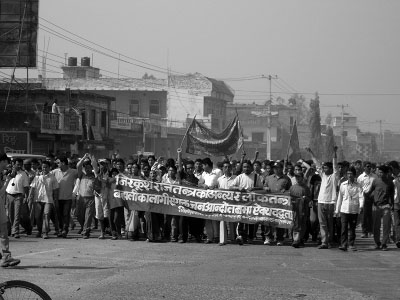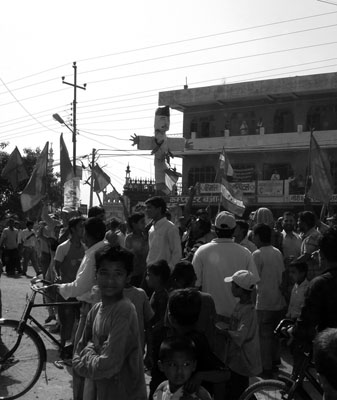Led by communists, Nepal is taking historic steps to abolish the hated monarchy and set up a republic. At midnight on 21 November an agreement between the Communist Party of Nepal (Maoist) and the Seven Party Alliance (SPA) was signed which will ultimately result in elections to a Constituent Assembly by June 2007 at the latest. It was agreed that the first session of this assembly will then vote, needing just a simple majority, to end the centuries-old monarchy which has strangled the development of the country and acted in collusion with imperialism, and which, under King Gyanendra, has been brutal and murderous towards the people in city and countryside alike.
Before those elections, the CPN(M) will take part in an interim government and both the People's Liberation Army (PLA) and Nepalese Army (formerly Royal Nepalese Army) will be encamped in certain areas, with their arms locked away and under supervision. Questions cry out to be answered. Why has the CPN(M) seemingly called a halt to the 11-year People's War which has seen them grow from a small isolated party to being in control of 85 per cent of the country? What's more, how will US imperialism, its loyal lapdog Britain and also Indian expansionists react?

|
|
Demonstration early in 2006 against royal rule in Nepal.
|
In the past few weeks the international media have covered the historic peace agreements in Nepal, focusing on the success in drawing the CPN(M) to the supposed "political mainstream." But it doesn't require a long look to see that in fact, the Maoists, covering about 80 per cent of the population and 85 per cent of the territory of Nepal, have long occupied the "mainstream" in Nepalese politics. This striking situation has developed since 1996, when the CPN(M) started a People's War armed with the ideas of Marx, Lenin and Mao and aimed against the evils of feudalism, imperialism and bureaucratic capitalism. The CPN(M) established base areas and formed a PLA, and by 2003 it was able to announce that the People's War was passing into the stage of strategic offensive.
In April 2006 a mass movement sparked by a three-day shutdown of the country developed into a 19-day general strike and forced King Gyanendra, from whom even the imperialists were beginning to distance themselves, to recall parliament. During these 19 days of strike and peaceful civil disobedience the security forces killed over 20 people, who became martyrs in the struggle. During the April Movement, protesters loyal to the main parties in the SPA warned their own leaders "do not betray us" by reconciliation with the monarchy. It is clear that although this heroic struggle forced the king to retreat, the principal aspect of the process culminating in this achievement has been the successful development of People's War.
Uniting all who can be united
Since 2001 the CPN(M) has understood that the various Nepalese bourgeois parliamentarian parties were in contradiction to the feudal monarchy, even though on the surface they were in many ways very close. This contradiction was heightened after the massacre of the royal family in 2001 and the ascension of the "regicidal, fratricidal and genocidal" King Gyanendra (as he's known to the Nepalese), and reached even greater heights after Gyanendra dissolved parliament and took autocratic powers in February 2005. Since then, a series of agreements between the CPN(M) and the SPA laid the basis for the April Movement and for elections to a Constituent Assembly which would decide the fate of the monarchy.
So why is the CPN(M) making agreements with the SPA, which is nominally much weaker, which does not control any part of Nepal and which has no loyal army? The CPN(M) has pursued this policy for a number of reasons, despite its undoubted dominance through most of Nepal.
Firstly, the People's War has already reached the stage of liberating the vast majority of the countryside but needs to penetrate more deeply into the urban areas. For this reason, the tactics of isolating the monarchy and creating a United Front with the SPA allows them greater influence at a time when simply resorting to armed struggle would alienate large swathes of the urban Nepalese.
Secondly, the party has analysed the international situation and seen that the revolution in Nepal is at present isolated, even with the growing Maoist insurgency in India, and it is important to maintain as broad a unity as possible, while remaining unswervingly fixed in political line and strategic goals.
The CPN(M) does not claim that democratic elections are an end in themselves, or simply a tactic for this stage of the revolution, or replacement for the dictatorship of the proletariat. But it reckons they will promote more debate within society and along with vigorous party struggle and rectification, serve in future as a mechanism to prevent capitalist restoration.
In November, Comrade Suresh, a CPN(M) Central Committee member and one of their top negotiators in the current agreements, visited London and gave an inside perspective. In a series of public meetings he was questioned especially hard on the role of elections, the surrendering of arms and the acceptance of the UN as a so-called impartial observer. Suresh was keen to relay to people that "the Constituent Assembly is just a resting place on the way to revolution", and that they have not lost sight of their strategic goals.
He recognised that up to now the enemies of the revolution have aimed to strangle it with violence, as in Peru. Now that the CPN(M) has instigated elections, enemies will aim to strangle it by other means, as in Nicaragua. It is certain that the SPA will benefit from financial support from the imperialists, who will do all they can to prevent the formation of a Maoist dominated government. However, Suresh explained, by sticking to their firm principles, they will be able to analyse the situation correctly and maintain their strategy that has brought them to this point now, within sight of abolishing the monarchy.
A People's Army
Comrade Suresh was also questioned on the decision to place the PLA in cantonments and their weapons under lock and UN supervision. While it is true that the PLA's arms are now locked away, the agreement clearly states that it is under a "single-lock" system, the key to which is with the PLA. This is the same procedure as with the formerly royal Nepalese Army. In the event of being attacked, or in an emergency such as a coup, the PLA would be quick to take up their weapons again.
But they are clear that they will only do this if forced to. What about the question of UN supervision, which might be used by imperialism to intervene directly in Nepal?
However, the CPN(M) is keen to exploit the present contradiction between US and British imperialism on the one hand, with its direct murder and oppression such as in Afghanistan and Iraq, and a more restrained view which places more importance on "multilateralism" and "diplomacy" on the other. It is thus not the case that the CPN(M) is giving up armed struggle and joining "mainstream politics". Instead, it is working along a process towards New Democratic Revolution, and uniting with all who can be united with.
Beacon
The Nepalese revolution is a beacon for those around the globe who yearn to throw off the chains of oppression. And indeed the revolution is not developing in Nepal separately from the global struggle. The imperialists will do all they can to ensure the Nepalese are never allowed to smash their own chains. The Indian expansionists are watching events closely, and indeed the true nature of the system prevalent in China since the death of Mao is laid bare by the Chinese refusal to even call the Nepalese "Maoists" but simply "guerrillas."
In fact, as Suresh joked, "the Chinese Communist Party is worried about the export of Maoism from Nepal!" The CPN(M) will have to manage the contradiction inherent in a country locked between two giants, and will also have to keep a watchful eye on the role being played by the US and British governments.

|
|
Crowds in Nepalgunj, just across the border from India, earlier this year demonstrating against King Gayendra. Shortly after this picture was taken, the effigy of the king (centre of picture, top) was burnt.
|
While these momentous events were taking place, people from Europe, North America and Asia joined the 3rd International Road-Building Brigade to Nepal, successfully reached the district of Rolpa and worked side-by-side in internationalist solidarity with the Nepalese masses in the construction of the Martyrs Road, a 91-kilometre road in an area where government after government, NGO after NGO, have promised to help the people but have never put their words into action. Under the leadership of the Maoists, the people are picking up the tools in their own hands and working collectively to build a new future (see www.aroadtothefuture.org for more info on the brigades as well as how to volunteer).
This solidarity can be contrasted with the solidarity the British imperialist government has shown towards the Nepalese royal government, "gifting" so-called "non-lethal" helicopters to the royal government of Nepal, which were then customised and used to attack Nepalese villagers (see article in the Guardian 11/04/2006 by Isabel Hilton).
Comrade Suresh began the public meetings by expressing his happiness at being in Britain, a visit he never thought he would be able to make because up until May he had been locked away in a royal prison. However, while there he said that one of the prison officials had asked him why he is so "famous" in Europe, at which he showed Suresh newspaper reports of the protests in Europe against his and other leading cadres' detention. Just a small example, but while we work to build a movement in this country to threaten imperialism it is testament to how working people here can make a difference by supporting the revolution in Nepal.
While Nepal is at present in a possibly lasting state of peace with the Maoists entering an interim government, the British and American governments are still watching to see how the Nepalese revolution develops, waiting for an opportunity to intervene. While this remains a possibility the people of Britain should unite together to oppose imperialist intervention in Nepal, as well as anywhere else in the world.
This article was contributed by comrades who went to Nepal as part of the International Road-Building Brigades to Nepal. For more information, see www.aroadtothefuture.org.

